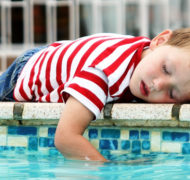Have You Prayed for Any Kings Lately?
Daily Reflection / Produced by The High Calling
I urge, then, first of all, that petitions, prayers, intercession and thanksgiving be made for all people—for kings and all those in authority, that we may live peaceful and quiet lives in all godliness and holiness.
1 Timothy 2:1-2
1 Timothy 2:2 is one of the most regularly disobeyed verses in the Bible, and maybe that isn't too bad. Now, before you cancel your subscription to the Daily Reflections and cast me out as a heretic, please let me explain.
1 Timothy 2:1 calls us to pray for all people, asking God to help them, interceding and giving thanks for them. Of course most of us don't literally pray for "all people," since that would take a fair amount of time. Rather, we rightly understand that this verse uses "all" in a less-than-literal sense. It means, "Pray for lots of people" and "When you pray for people, be sure to ask God to help them and to give thanks for them." So, I'm not too worried if you don't try to pray for all the people in the world today.
The second verse focuses the general imperative of the first verse. It reads, "Pray this way for kings and all who are in authority so that we can live peaceful and quiet lives marked by godliness and dignity" (1 Tim. 2:2). Quite plainly, the text says that we are to pray for kings. Do you? Have you ever done so? I expect you have if you are British, Jordanian, or Tongan. There are a few kings (and queens) left in the world today. But most of us live in countries that no longer have royalty, even in mainly symbolic roles. If, like me, you're an American citizen, you may never have prayed for a king or queen before, and you haven't been worried that you are somehow disobeying a literal command of Scripture, even though you are.
You rightly understand that you need to interpret and apply the biblical text in light of changing cultural contexts. Paul and the first Christians lived under the power of a sovereign ruler (the Roman emperor). Thus, they could literally obey 1 Timothy 2:2 by praying for Caesar. Paul was not asking them to figure out other kings who needed prayer. Rather, he was telling Timothy and those influenced by him to pray for their own ruler. They were to do so even if that ruler was tyrannical and even though they had no ability to influence the choice of ruler or the policies of the ruler.
Most of us who receive these Daily Reflections live in nations where we can help to determine who leads us and the policies they adopt. We should certainly live out our earthly citizenship faithfully through our voting, advocacy, and activism. But, above all, we should pray for our leaders, that is to say, for those who are in civil authority over us. We should pray for those with whom we agree as well as those with whom we disagree. We should pray for national, state, county, city, and other government officials.
On this Fourth of July, when Americans celebrate our freedom as a nation, I can think of no better time to take 1 Timothy 2:2 seriously. No, I'm not suggesting that we pray for King George III, the last king to reign over the land that became the United States. Rather, I'm encouraging us to pray for our leaders. No matter the country where you live, you can follow the spirit of 1 Timothy 2:2 even if you aren't governed by a king.
QUESTIONS FOR FURTHER REFLECTION: Why do you think it's important for us to pray for our government leaders? What encourages you to pray for them? What discourages you from praying for them?
PRAYER: King of kings and Lord of lords, today we offer prayer for our leaders. We believe that they serve under your authority, whether they recognize you or not. We thank you for the ways you use them for your purposes. We thank you for the times they seek your guidance. Help them, O God, to discern your ways and walk in them. Amen.
______________________________
Best Vacation Stories
While the stereotypical summer vacation usually involves a cabin or a beach, the vacations most of us take are much less nostalgic and far more varied than that. Or even if there is a beach or a cabin, it’s not the one we see in movies or read in books. Some of the best vacations, in fact, don’t involve packing or traveling at all; they happen in the backyard or on the front porch. At The High Calling, we’re telling some of our best vacation stories, the ones where things didn’t turn out as expected, where plans changed and so did we.






